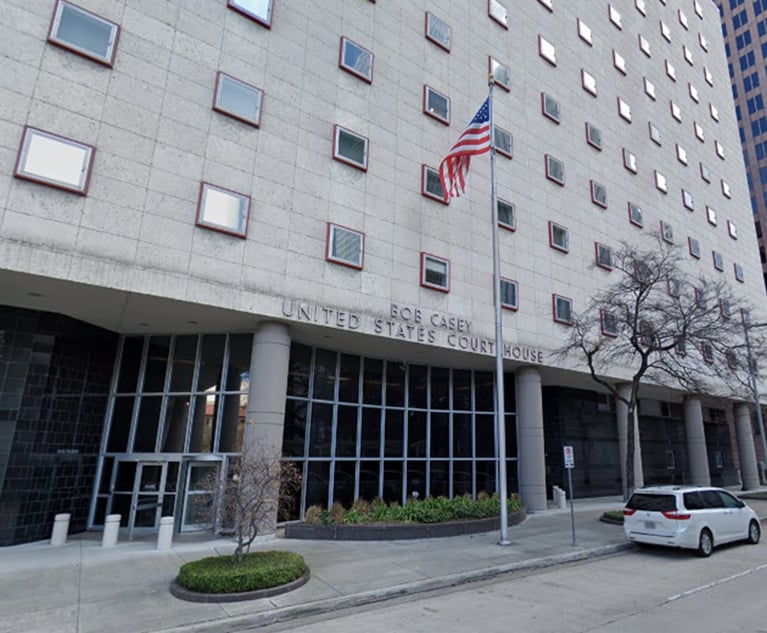Airline Bankruptcy Lands Lawyer CEO in Contempt
A regional airline's bankruptcy case has put the CEO, an attorney and son of a prominent Louisiana lawyer and political fundraiser, on the hook for contempt.
April 24, 2018 at 05:07 PM
4 minute read
 GLO aircraft at Louis Armstrong New Orleans International Airport.
GLO aircraft at Louis Armstrong New Orleans International Airport.
A bankruptcy judge has held the chief executive officer of defunct regional airline FlyGLO LLC in contempt, finding that the executive, a son of a prominent Louisiana-based trial lawyer involved in the BP oil spill litigation, hampered an aircraft company's efforts to reclaim planes that it had leased to the airline.
The ruling by U.S. Bankruptcy Judge Jerry Brown in New Orleans, issued April 12, held FlyGLO CEO Calvin “Trey” Fayard III personally in contempt and ordered him to pay sanctions just shy of $106,000. The judge found that Fayard had made it difficult for Alandia Ab, an aircraft leasing company based in Finland that was FlyGLO's largest unsecured creditor in a Chapter 7 bankruptcy, to recover three Saab 340 airplanes that FlyGLO rented for its regional airline.
“Fayard engaged in a course of conduct that made it difficult for Alandia to obtain the paperwork and information it needed so that it could collect its planes and begin doing what needed to be done so that Alandia could find another lessor for its planes,” Brown wrote in his contempt ruling.
Fayard, lawyer himself, is the son of Calvin Fayard Jr., a trial lawyer involved in the BP oil spill lawsuits and a well-known Democratic political fundraiser in Louisiana. Fayard Jr. and his firm, Fayard & Honeycutt, were reportedly awarded legal fees of more than $36 million in connection with the oil spill litigation.
The younger Fayard started FlyGLO, which operated as GLO Airlines, in 2015 as a company offering regional flights between New Orleans and several cities in the U.S. Gulf Coast region: Shreveport, Louisiana; Memphis, Tennessee; Fort Walton Beach, Florida; and Little Rock, Arkansas. FlyGLO didn't own its airplanes; instead, it leased them from Alandia, and the airline had an arrangement in which a separate company, Corporate Flight Management LLC (CFM), provided the crew and maintenance for the planes.
In April 2017, the company filed for Chapter 11 protection in New Orleans federal bankruptcy court. After the initial bankruptcy filing, FlyGLO and CFM became embroiled in a contractual dispute that kept the airline from staffing its flights. The airline then shut down entirely in June and the bankruptcy, which listed Alandia as an unsecured creditor owed $1.2 million, was converted to a Chapter 7 proceeding in September.
As its bankruptcy case got going, FlyGLO reached a court-approved consent agreement with Alandia that required FlyGLO to meet certain obligations with respect to paperwork and maintenance for the planes it had leased. In June, after it became clear that FlyGLO would no longer be able to staff its flights, Fayard contacted Alandia's CEO and laid out a time frame for returning the leased airplanes.
Ultimately, the planes were returned more than a month after Fayard had promised and Alandia alleged in a motion for contempt that Fayard and FlyGLO had fallen short on the consent agreement. Alandia alleged that FlyGLO didn't meet its obligations to keep the planes' paperwork current and ensure that they were properly maintained. Alandia also alleged that FlyGLO failed to make the planes available for Alandia to recover in a timely manner.
In his April 12 decision, Brown ruled that Fayard had personal liability for causing Alandia to wait more than a month to recover its airplanes after the leases expired. The bankruptcy judge awarded $105,863.25, an amount that, according to Brown's ruling, would cover the rental income that Alandia lost due to delays in the airplanes' return.
A lawyer representing Fayard, William Steffes of the Baton Rouge-based Steffes, Vingiello, McKenzie, declined to comment on Tuesday, citing the ongoing nature of the case. A lawyer representing Alandia's interests in the bankruptcy court, David Waguespack of Carver, Darden, Koretzky, Tessier, Finn, Blossman & Areaux, also declined to comment.
This content has been archived. It is available through our partners, LexisNexis® and Bloomberg Law.
To view this content, please continue to their sites.
Not a Lexis Subscriber?
Subscribe Now
Not a Bloomberg Law Subscriber?
Subscribe Now
NOT FOR REPRINT
© 2025 ALM Global, LLC, All Rights Reserved. Request academic re-use from www.copyright.com. All other uses, submit a request to [email protected]. For more information visit Asset & Logo Licensing.
You Might Like
View All
Topping Kirkland, Weil Won the Most Valuable Major Bankruptcy Retentions of 2024

Cleary vs. White & Case: New York City Showdown Over $5 Billion Brazilian Bankruptcy
Trending Stories
- 1'It's Not Going to Be Pretty': PayPal, Capital One Face Novel Class Actions Over 'Poaching' Commissions Owed Influencers
- 211th Circuit Rejects Trump's Emergency Request as DOJ Prepares to Release Special Counsel's Final Report
- 3Supreme Court Takes Up Challenge to ACA Task Force
- 4'Tragedy of Unspeakable Proportions:' Could Edison, DWP, Face Lawsuits Over LA Wildfires?
- 5Meta Pulls Plug on DEI Programs
Who Got The Work
Michael G. Bongiorno, Andrew Scott Dulberg and Elizabeth E. Driscoll from Wilmer Cutler Pickering Hale and Dorr have stepped in to represent Symbotic Inc., an A.I.-enabled technology platform that focuses on increasing supply chain efficiency, and other defendants in a pending shareholder derivative lawsuit. The case, filed Oct. 2 in Massachusetts District Court by the Brown Law Firm on behalf of Stephen Austen, accuses certain officers and directors of misleading investors in regard to Symbotic's potential for margin growth by failing to disclose that the company was not equipped to timely deploy its systems or manage expenses through project delays. The case, assigned to U.S. District Judge Nathaniel M. Gorton, is 1:24-cv-12522, Austen v. Cohen et al.
Who Got The Work
Edmund Polubinski and Marie Killmond of Davis Polk & Wardwell have entered appearances for data platform software development company MongoDB and other defendants in a pending shareholder derivative lawsuit. The action, filed Oct. 7 in New York Southern District Court by the Brown Law Firm, accuses the company's directors and/or officers of falsely expressing confidence in the company’s restructuring of its sales incentive plan and downplaying the severity of decreases in its upfront commitments. The case is 1:24-cv-07594, Roy v. Ittycheria et al.
Who Got The Work
Amy O. Bruchs and Kurt F. Ellison of Michael Best & Friedrich have entered appearances for Epic Systems Corp. in a pending employment discrimination lawsuit. The suit was filed Sept. 7 in Wisconsin Western District Court by Levine Eisberner LLC and Siri & Glimstad on behalf of a project manager who claims that he was wrongfully terminated after applying for a religious exemption to the defendant's COVID-19 vaccine mandate. The case, assigned to U.S. Magistrate Judge Anita Marie Boor, is 3:24-cv-00630, Secker, Nathan v. Epic Systems Corporation.
Who Got The Work
David X. Sullivan, Thomas J. Finn and Gregory A. Hall from McCarter & English have entered appearances for Sunrun Installation Services in a pending civil rights lawsuit. The complaint was filed Sept. 4 in Connecticut District Court by attorney Robert M. Berke on behalf of former employee George Edward Steins, who was arrested and charged with employing an unregistered home improvement salesperson. The complaint alleges that had Sunrun informed the Connecticut Department of Consumer Protection that the plaintiff's employment had ended in 2017 and that he no longer held Sunrun's home improvement contractor license, he would not have been hit with charges, which were dismissed in May 2024. The case, assigned to U.S. District Judge Jeffrey A. Meyer, is 3:24-cv-01423, Steins v. Sunrun, Inc. et al.
Who Got The Work
Greenberg Traurig shareholder Joshua L. Raskin has entered an appearance for boohoo.com UK Ltd. in a pending patent infringement lawsuit. The suit, filed Sept. 3 in Texas Eastern District Court by Rozier Hardt McDonough on behalf of Alto Dynamics, asserts five patents related to an online shopping platform. The case, assigned to U.S. District Judge Rodney Gilstrap, is 2:24-cv-00719, Alto Dynamics, LLC v. boohoo.com UK Limited.
Featured Firms
Law Offices of Gary Martin Hays & Associates, P.C.
(470) 294-1674
Law Offices of Mark E. Salomone
(857) 444-6468
Smith & Hassler
(713) 739-1250












